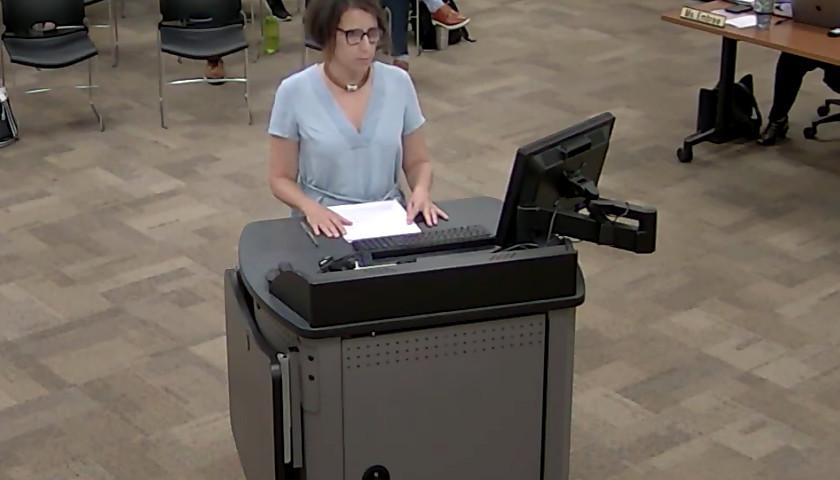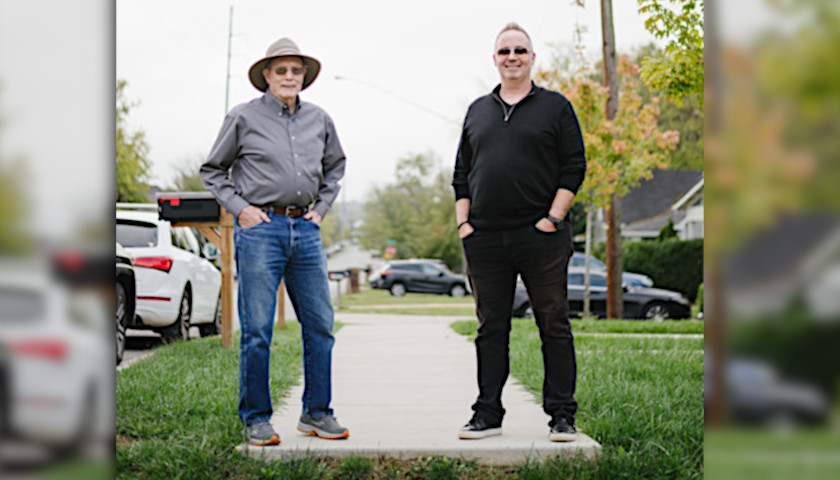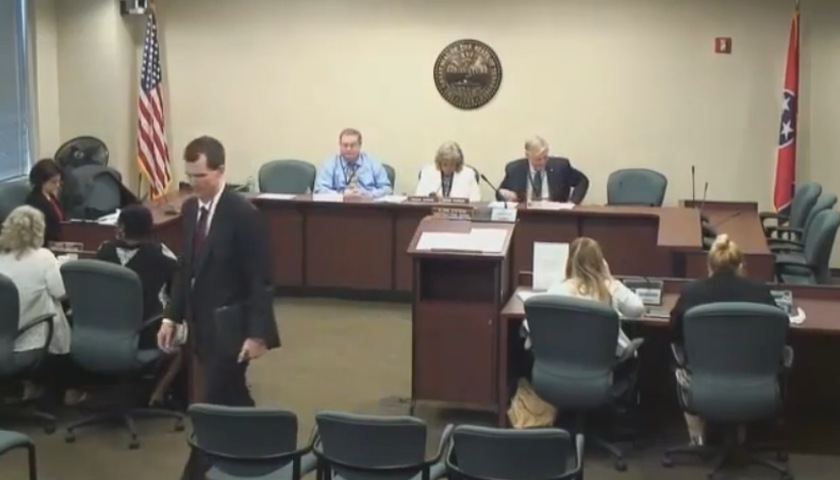Attorney and newest all-star panelist Braden Boucek joined host Michael Patrick Leahy on Monday’s episode of The Tennessee Star Report to discuss to administrative overreach and bizarre secrecy surrounding the Covenant Killer Manifesto and how lawmakers convening in the special session could obtain and review those materials today.
Read the full storyTag: Braden Boucek
Former U.S. Attorney Braden Boucek: Leak of Audio Recording Used as Evidence in Trump Indictment Creates Potential Problems for DOJ Prosecution
Former U.S. Assistant Attorney and current Director of Litigation for the Southeastern Legal Foundation Braden Boucek joined The Tennessee Star Report’s Michael Patrick Leahy in studio Tuesday to discuss the how the widely-broadcast recording of former President Donald Trump made it’s way from Mar-a-Lago into the hands of the Department of Justice and then CNN.
Read the full storyJudge Threatens Parents with Massive Penalties for Challenging School Antiracism Dogma: Lawyers
Two teachers challenging the constitutionality of compelled antiracism training have been ordered to pay nearly $313,000 in their Missouri school district’s legal fees, under a ruling their lawyers called “overtly hostile” and “meant to scare off future lawsuits by parents and teachers.”
The Southeastern Legal Foundation is appealing U.S. District Judge Douglas Harpool’s summary judgment in favor of Springfield Public Schools and the six-figure award against their clients Brooke Henderson and Jennifer Lumley, according to an 8th U.S. Circuit Court of Appeals notice Friday.
Read the full storyFormer Assistant US Attorney for West Tennessee: Lack of Experience and Supervision, SCORPION Unit Ripe for Disaster
Monday morning on The Tennessee Star Report, host Leahy welcomed the CEO of the Tennessee Firearms Association, John Harris and former West Tennessee Assistant U.S. Attorney, Braden Boucek in studio to discuss the details of the Memphis Scorpion Unit that murdered Tyre Nichols last Thursday evening.
Read the full storyAssistant US Attorney Braden Boucek and Lawyer John Harris Speculate on Charges to be Brought Against Memphis Police Officer Murder in Tyre Nichols Death
Monday morning on The Tennessee Star Report, host Leahy welcomed TFA CEO John Harris and former Assistant US Attorney Braden Boucek in studio to speculate on final murder charges for the five Memphis police officers involved in the death of Tyre Nichols.
Read the full storyAttorney Braden Boucek Comments on the U.S. Supreme Court So-Called Investigation into the Dobbs Decision Leak
Friday morning on The Tennessee Star Report, host Leahy welcomed attorney Braden Boucek of the Southeastern Legal Foundation in studio to analyze the so-called investigation into the U. S. Supreme Court document leak in response to the Dobbs decision in February 2022.
Read the full storySoutheastern Legal Foundations’ Braden Boucek Talks SCOTUS Clerks’ Invocation of Self-Incrimination Surrounding Press Leak
Friday morning on The Tennessee Star Report, host Leahy welcomed all-star panelist, Braden Boucek in studio to discuss the details of the SCOTUS leak investigation and Penn Biden Center classified docs.
Read the full storyJournalist Jon Styf on Brittney Griner Trade, Tennessee Titans Stadium Deal’s Downfalls
Thursday morning on The Tennessee Star Report, host Leahy welcomed journalist for The Center Square Jon Styf on the newsmaker line to comment on Brittney Griner release and dimensions of the $2.1 billion-dollar Tennessee Titans stadium deal.
Read the full storyThe Beacon Center’s Mark Cunningham Discusses Lack of Transparency in $2.1 Billion Titans Stadium Deal
Thursday morning on The Tennessee Star Report, host Leahy welcomed the Director of Communications for the Beacon Center, Mark Cunningham to the newsmaker line to discuss the lack of transparency in the new Titans stadium’s $2.1 billion dollar deal.
Read the full storyTennessee AG Skrmetti Comments on Taylor Swift Debacle, Walmart and Google Settlements
Thursday morning on The Tennessee Star Report, host Leahy welcomed Tennessee Attorney General Jonathan Skrmetti to the newsmaker line to discuss the Taylor Swift, Ticketmaster debacle and big settlement for the state from Walmart and Google.
Read the full storySLF Litigation Director Braden Boucek Discusses the Recent USDA Reward of $2.2 Billion for Racism
Thursday morning on The Tennessee Star Report, host Leahy welcomed Litigation Director, Braden Boucek of Southeastern Legal Foundation in studio to discuss his recent article regarding bureaucracy, racism, and the United States Department of Agriculture scam.
Read the full storySoutheastern Legal Foundation’s First Amendment Director Cece O’Leary Discusses America’s Biased College Campus Climates
Friday morning on The Tennessee Star Report, host Leahy welcomed attorney Cece O’Leary of Southeastern Legal Foundation and its director of 1A (First Amendment) violations to the newsmaker line to deep dive into the biased policies limiting freedom of speech on college campuses in America.
Read the full storyBraden Boucek Reflects on Past Work at DOJ and as an Assistant United States Attorney
Friday morning on The Tennessee Star Report, host Leahy welcomed Southeastern Legal Foundation Director of Litigation and guest all-star panelist, Braden Boucek in studio to discuss his past experience at the DOJ and as an Assistant United States Attorney.
Read the full storyGuest All Star Panelist Braden Boucek on How the FBI Wastes Resources by Using Aggressive Enforcement
Friday morning on The Tennessee Star Report, host Leahy welcomed Southeastern Legal Foundation Director of Litigation and guest all-star panelist, Braden Boucek in studio to discuss wasted resources by the FBI through aggressive enforcement and what it was like working at the Department of Justice under Mueller and Comey.
Read the full storyTennessee AG Skrmetti: ‘We Can’t Have a Functional Democracy’ When Administrative State Is Making Major Policy Decisions
Monday morning on The Tennessee Star Report, host Leahy welcomed Tennessee’s new Attorney General, Jonathan Skrmetti in studio to explain Title XI, the unelected administrative state, and the job’s biggest surprise.
Read the full storyBraden Boucek Says Selection of Jonathan Skrmetti As TN AG a Win for Tennesseans
Friday morning on The Tennessee Star Report, host Leahy welcomed Southeastern Legal Foundation Director of Litigation Braden Boucek to the newsmaker line to discuss the recent Tennessee state attorney general appointment of conservative Jonathan Skrmetti.
Read the full storySoutheastern Legal Foundation’s Braden Boucek on Status of ESA Offering Educational Options to Davidson, Shelby County Families
Monday morning on The Tennessee Star Report, host Leahy welcomed Southeastern Legal Foundation’s Director of Litigation Braden Boucek to the newsmaker line to explain how the educational savings account works and updates on pending litigation that proves the state is not interested in letting parents control their children’s education.
Read the full storyCommentary: Nashville Sidewalk Extortion Faces Court Appeal
If you want to build a house, obviously you have to pay the owner for the land.Otherwise, it is theft. Property rights are the bedrock of a civil society. Just read the Constitution. Personal property rights are guaranteed even against the government by the Fifth Amendment.
If John Smith wants to build a house on land owned by Jane Doe, he purchases the land from her. But what happens when a local government wants to build a road or sidewalk across someone’s property? Unlike John Smith, the government can make Jane Doe sell, but the government must still pay fair value.
Read the full storySoutheastern Legal Foundation’s Director of Litigation Braden Boucek Explains Nashville’s Sidewalk Extortion
Tuesday morning on The Tennessee Star Report, host Leahy welcomed The Southeastern Legal Foundation’s Braden Boucek to talk about Metro Nashville’s sidewalk extortion.
Read the full storySoutheastern Legal Foundation’s Braden Boucek Explains Springfield, Missouri’s Equity Training Asking Teachers to Rate Themselves on Oppression Matrix Chart
Thursday morning on the Tennessee Star Report, host Michael Patrick Leahy welcomed Southeastern Legal’s Braden Boucek to the newsmakers line to explain the CRT lawsuit against the Springfield, Missouri public school board requiring equity training of its teachers.
Read the full storyBiden Administration Hasn’t Responded to Court Injunctions on Loan Forgiveness Excluding White Farmers
The White House hasn’t addressed the court-ordered injunctions against President Joe Biden’s loan forgiveness program that excludes white farmers. The latest ruling came late last week through a Tennessee farmer’s challenge to the program’s alleged racial discrimination. United States District Judge Thomas Anderson agreed with the Tennessee farmer’s take on the program’s discriminatory practices, ruling the program unconstitutional and issuing a nationwide injunction to halt it on Thursday in the case, Holman v. Vilsack et al. Another federal judge in Wisconsin issued a similar ruling last month, and a little over two weeks ago a federal judge in a similar Florida case offered a concurring ruling.
The Southeastern Legal Foundation (SLF) and Mountain States Legal Foundation (MSLF) brought the case with the latest ruling on behalf of Tennessee farmer Rob Holman. According to the Biden Administration’s loan forgiveness program in the American Rescue Plan Act of 2021, Holman was ineligible for forgiveness on his farm loans solely because he’s white. According to the law, only “socially disadvantaged groups” were eligible for the program granting up to 120 percent of loan forgiveness, re-application for government backed loans, and a cash gift of 20 percent of the loan’s value to cover any income tax liability. Socially disadvantaged groups were defined as those with members who faced racial or ethnic prejudice.
Read the full storySoutheastern Legal Foundation’s Braden Boucek on Anti-Racist Training: ‘Pits Us All Against Each Other’
Thursday morning on the Tennessee Star Report, host Michael Patrick Leahy welcomed Southeastern Legal Foundations director of litigation Braden Boucek to the newsmakers line to discuss a current lawsuit in Evanston, Illinois which misinterprets equality as equity.
Read the full storyNashville Think Tank Files Lawsuit Against Metro Nashville Over Sidewalks
Members of the Nashville-based Beacon Center of Tennessee this week filed a lawsuit against the city of Nashville on behalf of two homeowners that Metro officials forced to pay for public sidewalks.
Beacon officials said in an emailed press release that they are filing the case to prevent Metro officials from holding building permits hostage until individual property owners agree to pay for public infrastructure like sidewalks.
Read the full storyThe Beacon Center Vice President of Legal Affairs Braden Boucek Weighs in on School Voucher Ruling and Taking It to the Tennessee Supreme Court
Friday morning on the Tennessee Star Report, host Leahy welcomed the Vice President of Legal Affairs at The Beacon Center Braden Boucek to the show to discuss the recent ruling regarding the school voucher program in Tennessee.
Read the full storyNashville Court Dismisses Home-Based Business Lawsuit
Nashville’s Chancery Court of Davidson County this week dismissed a lawsuit that a Grammy-winning producer and a hairstylist filed against the city’s regulations restricting home-based businesses. The Nashville-based free market think tank the Beacon Center of Tennessee assisted these two individuals, Lij Shaw and Pat Raynor. Beacon Vice President of Legal Affairs Vice President Braden Boucek discussed the matter with The Tennessee Star Thursday. “The court granted summary judgment to the city of Nashville, saying it is rational to keep a little old lady from cutting hair in her garage and threatened to seize the property of a home studio in Nashville,” Boucek said. “The clients are disappointed, but we build these things to be won at the appellate court level from the ground up. The judge is a good judge. We like her, but she felt bound by her analysis to rule based on metro imagining what would happen if these people were allowed to have home businesses and she felt obligated to disregard the actual facts, which showed that they would have zero impact on the neighborhood in any way. It was a deeper Constitutional question about whether the facts matter when it comes to someone’s ability…
Read the full storyNew Tennessee Law Ruled Unconstitutional, Says Beacon Center Official
A federal judge has halted enforcement of a new state law that state legislators passed earlier this year that forces online auctioneers to get a state license. This, according to Braden Boucek, vice president of legal affairs for the Nashville-based Beacon Center of Tennessee. Beacon is a free-market think tank. Boucek argued against the law in federal court. “We are confident that the law was unconstitutional and today’s ruling reinforced our conclusions. Tennesseans believe in freedom and shared economic opportunity. This law was a step in the wrong direction,” Boucek said. “The judge was correct to find it unconstitutional. As a state, we should be looking for ways to lower the barriers to employment, especially in rural counties. Instead, we passed a law that eradicated hundreds of good paying Tennessee jobs at the stroke of a pen.” In emailed statements to The Star, Aaron McKee from Purple Wave Auction said he was “really relieved that we are able to continue to conduct auctions without having to worry about breaking the law in Tennessee.” “I’m thankful that we live in a country with a Constitution that protects us in situations like this. It is difficult enough to do good business…
Read the full storyOther States Likely Monitoring Lawsuit Against Tennessee’s New ‘Online Auctioneer’ Law, Expert Says
Legislators in other states likely want to duplicate a new Tennessee law that’s currently under a temporary restraining order, per a U.S. federal judge, said someone involved in the legal proceedings. As The Tennessee Star reported this week, U.S. District Court Judge Eli Richardson of the Middle District of Tennessee issued the temporary restraining order. The order prevents state officials from enforcing a law that forces online auctioneers to get a state license. The temporary restraining order expires July 11 at noon. An injunction hearing on the matter is scheduled for July 10 at 9 a.m. Legislators in other states, including Louisiana, Mississippi, and Kentucky, will no doubt monitor the case, Will McLemore, one of the plaintiffs in the case, told The Tennessee Star this week. McLemore said he runs an online auction company out of Nashville. “Tennessee is looked to as a bellwether state for auction regulation. It has always been one of the most heavily regulated states for auctioneering,” McLemore said. “I do know there are a lot of other states who have watched this bill passed into law and are looking to it as a model or a possible model for the way they might proceed.” McLemore…
Read the full storyBeacon Center of Tennessee Files Suit Over New Online Auctioneer Law
The Nashville-based Beacon Center of Tennessee has filed suit against a new law that state legislators passed earlier this year that forces online auctioneers to get a state license. This, according to a press release Beacon officials released Thursday. The same press release said the state exempts big online auction sites, including Ebay. Beacon is a free-market think tank. “This law is not just unfair but is also unconstitutional, as it clearly violates the First Amendment,” Beacon spokesman Mark Cunningham said in the release. “Beacon is suing the Tennessee Auctioneer Commission before the law takes effect on July 1.” In an emailed statement to The Star, Beacon Vice President of Legal Affairs Braden Boucek (pictured above) said the law is “a step in the wrong direction.” “Tennessee is a state that values freedom and equal opportunity. A barrier to work is out of step with what Tennesseans value, no matter how ‘in step’ it might be for auctioneers who want to try and debilitate the upstart,” Boucek said. “As a state, we need to be committed to giving people access to good paying jobs, especially in rural counties.” As The Star reported in April, online auctioneers will suffer, as…
Read the full storyExpert: Tennessee Regulators are ‘Tammany Hall Hucksters’
A Tennessee businessman said he couldn’t sell his state-of-the-art security software because members of a state board told him no. But those regulators, specifically the five-member Alarm Systems Contractors’ Board, said that’s not true, because they never made a final decision on the matter. But go over the video and transcripts of one key meeting, said Braden Boucek, director of litigation for the Beacon Center of Tennessee, a Nashville-based free market think tank. It all boils down to board members telling the businessman, Adam Jackson, he had to get a license to sell his product. The Tennessee Star went over the transcripts and video of one key meeting. Board members explicitly told Jackson repeatedly to get licensed. “At no point do they ever indicate that he might not need a license, or that if he did his business differently, they’d change their mind,” Boucek said. During the meeting, board members read state law to Jackson to back up their position. At another point, board members said they didn’t write the law, but they were trying to uphold it. As reported, this board has existed since 1993. Members meet regularly to license, register, and regulate alarm systems contractors. They also judge…
Read the full storyTennessee Loses Out on New Security Technology Due to State Regulations
A Tennessee man who sold state-of-the-art technology that could have kept the state’s churches and schools more secure lost a substantial sum of money because state officials wouldn’t grant him the right to do business. This, according to members of the Beacon Center of Tennessee, a Nashville-based free market think tank. You may not know it, but since 1993 the state has had an Alarm Systems Contractors’ Board. Members meet regularly to license, register, and regulate alarm systems contractors. They also judge whether they’re competent at their jobs, according to the board’s website. The board has five members, and the governor appoints each of them. “Four of those members are alarm system installers themselves,” said Braden Boucek, Beacon’s director of litigation. Going by what Beacon says, the board, by a 3-2 vote, just reversed an earlier decision to classify Adam Jackson’s product as an alarm system — and that requires a license. “They told him his facial recognition software met the definition of an alarm system that would require licensure,” Boucek said. Jackson produces software that instantly scans the face of someone using existing security cameras and compares the image against known offender databases. Board members, Beacon said, wrongfully determined…
Read the full story
























